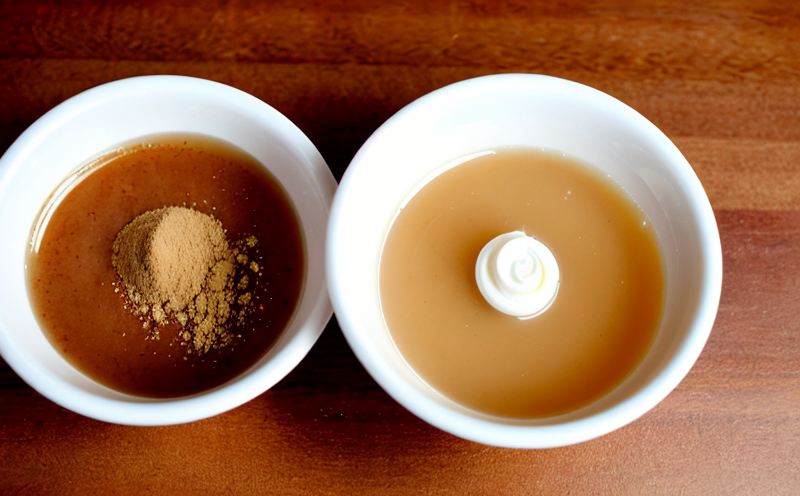EN 17425 Flavor Testing of Aroma Compounds in Beverages
The European Standard EN 17425 provides a comprehensive framework for the analysis and evaluation of aroma compounds present in beverages. This standard is particularly significant for manufacturers looking to ensure that their products meet high-quality flavor standards, align with regulatory requirements, and satisfy consumer expectations.
EN 17425 focuses on identifying and quantifying volatile and non-volatile compounds responsible for the distinctive flavors found in various types of beverages such as soft drinks, juices, teas, coffees, and alcoholic beverages. The standard covers a wide range of aroma compounds including esters, alcohols, ketones, acids, and other secondary metabolites that contribute to flavor profiles.
The testing process outlined by EN 17425 involves several key steps: sampling, sample preparation, extraction techniques (such as headspace solid-phase microextraction or solvent-based methods), analysis using gas chromatography coupled with mass spectrometry (GC-MS), and finally interpretation of results. Each step is critical for accurately capturing the aroma compounds present in a beverage.
Sampling is performed according to specified guidelines to ensure that representative samples are obtained from production batches or commercial products. Sample preparation may involve dilution, concentration, or derivatization processes depending on the specific compounds being analyzed. Extraction methods aim at efficiently transferring volatile and semi-volatile components into an appropriate solvent for subsequent analysis.
Analysis using GC-MS allows for precise identification and quantification of aroma compounds. This powerful analytical tool separates complex mixtures based on their retention times, allowing even trace amounts of compounds to be detected. The mass spectrum provides additional information about molecular structure which aids in compound identification.
Interpretation involves comparing the results against established reference profiles or target ranges set forth by EN 17425 for specific beverage types. This helps determine compliance with quality specifications and highlights any deviations from expected flavor profiles that could indicate issues during production processes.
The importance of this testing cannot be overstated, especially given increasing consumer demand for healthier alternatives while maintaining delicious taste experiences. By adhering to EN 17425 guidelines, companies can ensure their beverages are safe, consistent, and appealing to target markets.
Implementing EN 17425 also supports broader industry goals towards innovation in formulation science through continuous improvement of flavor profiles. This aligns with trends toward natural ingredients over artificial additives and personalized nutrition solutions tailored to individual consumer preferences.
In summary, implementing EN 17425 ensures rigorous quality control measures are in place for aroma compound analysis within the beverage sector. It fosters trust among consumers by delivering consistently enjoyable products that comply with international standards.
Industry Applications
EN 17425 flavor testing of aroma compounds is widely applicable across multiple segments within the beverage industry:
- Beverage Manufacturing: Ensuring consistent quality and adherence to formulation specifications.
- R&D: Identifying new flavors or improving existing ones via detailed compositional analysis.
- Quality Assurance: Monitoring production batches for compliance with set standards.
- Regulatory Compliance: Meeting legal requirements imposed by various jurisdictions worldwide.
This testing method plays a crucial role in maintaining brand reputation and customer satisfaction, especially when dealing with highly competitive markets where subtle differences in taste can significantly impact market share.
Customer Impact and Satisfaction
- Enhanced Product Quality: Rigorous testing ensures that only high-quality products reach the market.
- Informed Decision Making: Data-driven insights enable informed decisions regarding product improvements and innovations.
- Increased Consumer Trust: Compliance with international standards builds confidence among consumers about the safety and efficacy of purchased goods.
Companies that invest in EN 17425 flavor testing demonstrate their commitment to excellence, which ultimately translates into higher customer satisfaction levels and stronger brand loyalty.
Environmental and Sustainability Contributions
- Eco-Friendly Formulations: By identifying optimal aroma compound concentrations, this service helps reduce unnecessary additives while maintaining desired flavors.
- Resource Optimization: Efficient use of resources during production processes contributes positively to overall environmental footprint.
Incorporating EN 17425 into your operations signifies a proactive stance towards sustainability initiatives within the beverage industry.





